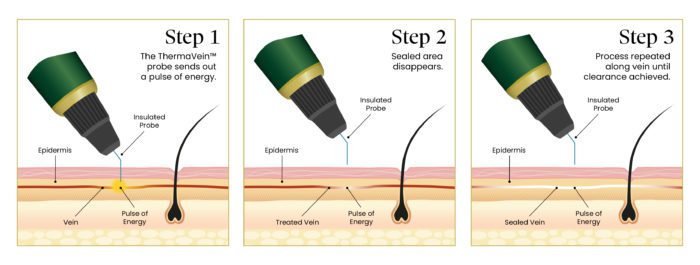Thermocoagulation
The below content has been medically reviewed and approved by Vein Specialist Mrs Helen Burndred at Veincentre.
Last reviewed 1st March 2023.
What is thermocoagulation?
Thermocoagulation is a microwave technique used to destroy thread veins on the face. Thermocoagulation is the gold standard treatment for facial thread veins, which are also known as spider veins on the face. The procedure is safe, effective and permanent, with instant visible changes, carries no risk of skin staining and minimal aftercare is required.
We treat veins on the face via thermocoagulation but it can also be used to treat veins on other parts of the body. In some instances, it is used on thread veins in the legs when a small percentage of people don’t respond well to microsclerotherapy. This is because some patients have such fine thread veins in the legs that they’re too small to access with a needle. Others can’t seem to get rid of their thread veins despite adequate injections.
Microsclerotherapy is the usual recommended treatment for thread veins on the legs. We never use microsclerotherapy on facial thread veins. This is due to the small risk that the injected liquid could enter blood vessels that are linked to the eyes or brain. Microsclerotherapy can also cause skin staining, which may last for many months and would appear unsightly on the face.
How does thermocoagulation work on thread veins?
Thermocoagulation works by sealing the vein closed. This leads to permanent destruction of the tiny, thin-walled veins. Heat is applied using microwave energy at the end of a minuscule needle, which just pricks the very surface of the skin that covers the vein. The vein itself is not punctured.
Heat is introduced every few millimetres along the vein, through the small needle. The vein instantly disappears in front of your eyes. There will be an inflammatory response to the treatment which may leave you with some redness and the appearance that the veins are still there. This can last a few weeks. Sometimes veins will require a further session of treatment in order to get a full cosmetic resolution. This will be discussed at consultation and after every appointment.
For most patients, thermocoagulation is very tolerable. It is often described to feel like small electric shocks. The procedure can make your eyes water when done around the nose.


We are processing your answers – hold tight!
Complete Quick Online Assessment
What are the risks associated with thermocoagulation?
All medical treatments carry a certain amount of risk, but thermocoagulation is very safe. There is a low risk of small, temporary scabs that resemble cat scratches, as well as bruising and scarring. There can occasionally be tiny red marks that appear, but these are usually eliminated through further treatment. No major side effects have been reported.
Thermocoagulation at VeinCentre
The appointment length of thermocoagulation is around 45 minutes. This includes consultation, the consent process and also the treatment, in which time we’ll treat as many veins as we can. If you feel like you would benefit from more cosmetic improvement, you may need to return for another session.
We offer thermocoagulation treatment at our clinics nationwide. Find your nearest clinic here.
Aftercare
The area that has been treated will be red and feel warm to the touch immediately after treatment, as it is an inflammatory response. This will usually calm down within the first few days. The treated skin may also start to feel dry and develop a few tiny micro scabs. In the days following treatment, some larger vessels may appear visible. This is normal and the vessels will gradually fade and be broken down by the body.
Although there is little aftercare required following thermocoagulation, there are a few things we recommend.
For the first 48 hours following treatment:
- Avoid wearing makeup (can be worn after 24 hours if necessary)
- Wash the treated area gently, do not scrub or rub the area
- Do not stretch the skin
- Avoid alcohol and spicy food if you are prone to flushed skin
- Avoid excessive exercise or any activities which cause sweating or dilation of the capillaries
- Apply aloe vera gel to the area to help soothe irritated skin
After healing:
- Use a good broad spectrum SPF to protect the skin
- Avoid using sunbeds
- Avoid harsh cleansing, steaming or exfoliation of the skin for the first week
- Use gentle products
- Use tepid water on the face, and when showering and having a bath, use water on a moderate temperature
- Do not stretch or pull the skin for the first week after treatment
Prices
Our thermocoagulation treatment prices are upfront and fixed.
Consultation (£100), followed by treatment – £200.
Extra sessions of thermocoagulation – £200. These are to be booked as required, ideally 4 to 6 weeks following initial treatment, but no longer than 6 months.
